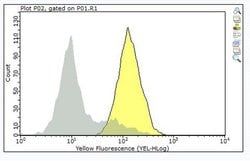Aminopeptidase N (CD13), Mouse anti-Human, Clone: 452, Millipore Sigma™
Manufacturer: Fischer Scientific
Select a Size
| Pack Size | SKU | Availability | Price |
|---|---|---|---|
| Each of 1 | MABF214725-Each-of-1 | In Stock | ₹ 17,118.26 |
MABF214725 - Each of 1
In Stock
Quantity
1
Base Price: ₹ 17,118.26
GST (18%): ₹ 3,081.287
Total Price: ₹ 20,199.547
Antigen
Aminopeptidase N (CD13)
Classification
Monoclonal
Conjugate
Unconjugated
Formulation
Purified mouse monoclonal antibody IgG1 in PBS without azide.
Gene Symbols
ANPEP;APN;CD13;PEPN
Immunogen
Isolated human dermal fibroblasts.
Quantity
25 μg
Research Discipline
Inflammation & Immunology
Gene ID (Entrez)
NP_001141
Target Species
Human
Form
Purified
Applications
Flow Cytometry, Immunocytochemistry, Immunoprecipitation, Inhibition Assays, Western Blot
Clone
452
Dilution
Immunocytochemistry Analysis: A representative lot detected Aminopeptidase N (CD13) in Immunocytochemistry applications (Rahman, M.M., et. al. (2014). Front Physiol. 4:402; Subramani, J., et. al. (2013). J Immunol. 191(7):3905-12).Flow Cytometry Analysis: A representative lot detected Aminopeptidase N (CD13) in Flow Cytometry applications (Subramani, J., et. al. (2013). J Immunol. 191(7):3905-12).Western Blotting Analysis: A representative lot detected Aminopeptidase N (CD13) in Western Blotting applications (Rahman, M.M., et. al. (2014). Stem Cells. 32(6):1564-77; Rahman, M.M., et. al. (2014). Front Physiol. 4:402).Agonist Analysis: A representative lot induced a temporal increase in phosphorylation of FAK, ERK and Src kinases in U937 cells. (Subramani, J., et. al. (2013). J Immunol. 191(7):3905-12).Immunoprecipitation Analysis: A representative lot immunoprecipitated Aminopeptidase N (CD13) in Immunoprecipitation applications (Subramani, J., et. al. (2013). J Immunol. 191(7):3905-12)
Gene Alias
AP-N;hAPN;Alanyl aminopeptidase;Aminopeptidase M;AP-M;Microsomal aminopeptidase;Myeloid plasma membrane glycoprotein CD13;gp150;CD13
Host Species
Mouse
Purification Method
Protein G purified
Regulatory Status
RUO
Primary or Secondary
Primary
Test Specificity
Clone 452 specifically detects Aminopeptidase N (CD13) in human cells.
Content And Storage
Stable for 1 year at -20°C from date of receipt. Handling Recommendations: Upon receipt and prior to removing the cap, centrifuge the vial and gently mix the solution. Aliquot into microcentrifuge tubes and store at -20°C. Avoid repeated freeze/thaw cycles, which may damage IgG and affect product performance.
Isotype
IgG1 κ
Description
- Anti-Aminopeptidase N (CD13), clone 452, Cat
- No
- MABF2147, is a mouse monoclonal antibody that detects Aminopeptidase N and has been tested for use in Flow Cytometry, Immunocytochemistry, Immunoprecipitation, Agonist function, and Western Blotting
- Aminopeptidase N (UniProt: P15144; also known as EC:3.4.11.2, AP-N, hAPN, Alanyl aminopeptidase, Aminopeptidase M, AP-M, Microsomal aminopeptidase, Myeloid plasma membrane glycoprotein CD13, gp150, CD13) is encoded by the ANPEP (also known as APN, CD13, PEPN) gene (Gene ID: 290) in human
- Aminopeptidase N is a single-pass type II membrane protein that is also found as a soluble form in cells
- It is widely expressed as a homodimer of 280 kDa on the cell surface in many tissues, including intestinal epithelia and the nervous system
- It serves as a broad specificity aminopeptidase that plays a role in the final digestion of peptides generated from hydrolysis of proteins by gastric and pancreatic proteases
- It preferentially cleaves N-terminus neutral amino acids, most notably alanine residue
- Aminopeptidase N is involved in many physiological processes, including antigen presentation regulation, differentiation, proliferation, apoptosis, cancer metastasis, and angiogenesis
- It is also involved in the processing of various peptides including peptide hormones, such as angiotensin III and IV, neuropeptides, and chemokines
- Human Aminopeptidase N consists of a short N-terminal cytoplasmic end (aa 2-8), a transmembrane domain (aa 9-32), and a large extracellular portion (aa 33-967), which is composed of a Ser/Thr-rich region (aa 33-68) and the metalloprotease domain (aa 69-967).






